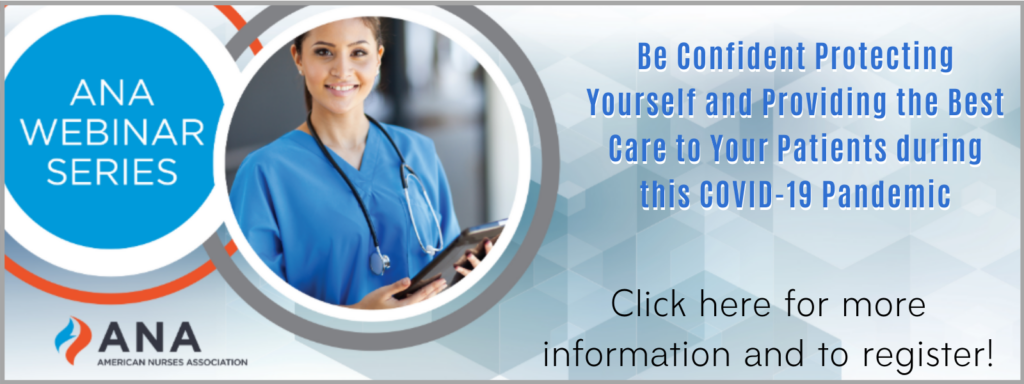Frequently Asked Questions from our Members
The Montana Healthcare Mutual Aid System (MHMAS) may be activated to assist with Montana’s Response to COVID-19. MHMAS is the emergency system for the advanced registration of volunteer healthcare professionals for the State of Montana. MHMAS is a secure, web-based online registration system used to register all levels of medical professionals to be needed to respond to a medical and/or public health emergency.
For the duration of the emergency declaration, there are no requirements that you do an initial visit face to face. These services are available to be rendered through telemedicine.
See links below.
Each case is examined individually and multiple factors are taken into account. Things like the level of interaction and exposure the nurse had with a positive patient will be examined. If you feel that you have been exposed at work, please file an incident report and a 1st report of injury with your employer and follow up with the employer’s workman’s compensation carrier.
Step 1 – Please contact your HR contact and/or your director/supervisor. Many facilities are addressing this situation differently, so make sure you find out AHEAD of time!
Step 2 – If you work at a facility covered by an MNA collective bargaining agreement, feel free to contact your Labor Representative as our labor department may have specific information from your facility.
As of 3/23/20, there are no travel restrictions within the US, however PLEASE check this link regularly for any travel restriction updates: https://covid19.mt.gov/ or https://www.cdc.gov/coronavirus/2019-nCoV/hcp/index.html
Step 1 – If you work at a facility covered by an MNA collective bargaining agreement, please contact your Labor Representative as your contract may offer you protections and your facility may have other arrangements for reduced hours of work.
Step 2 – You may qualify for Montana Unemployment Benefits. Please follow this link for information: http://uid.dli.mt.gov/
If you are thinking of reentering the workforce to assist with coronavirus, participate in as much refresher or orientation available. We all have to know our nursing abilities and limits and communicate them to leadership often so they can best place you in a unit or department where you can best be utilized. Thank you for stepping up to help in this time of need.
In a true emergency, we all must do the best we can with the abilities we have. We will all be in this together. These are unprecedented times.
Again, if you are limited, communicate that so you can be assigned an appropriate area of need. All RNs can take vital signs and comfort and reassure. We do this every day whether it’s at the bedside or to our family members.
- Facilities are reporting to DPHHS 2x/day, amount of PPE, ventilators, and beds
- It is NOT your nurses’ or facilities’ fault there is not enough PPE; this is a national and global issue so please help all healthcare workers in our country and click here to immediately submit a letter to Congress to address the PPE crisis
- All our CBAs have different language, but please keep your labor representative informed. Staffing and safety will be our #1 priority as your advocate, and significant changes are already occurring so communication is key.
- The most important thing everyone can do is wash your hands and keep your hands away from your face
- If you have a known exposure (without PPE), self-quarantine for 14 days
- Stay home and exercise social distancing (6ft minimum), only leaving home for groceries, prescriptions, work, or other critical outings.
- The World Health Organization says it is advisable to wear a protective mask in public if you suspect you are infected or someone you are caring for is–however, the most effective strategy if this is the case is to stay home whenever possible.
- Reach out to your labor representative, they will assist you with reviewing your contract and possibly requesting an accommodation from your employer to maximize your safety.
With hospital units shutting down and decreasing nurses in departments that mostly cater to elective procedures, such as Operating Room, Endoscopy, and Same Day Surgery, our focus over the past few days has been securing work for these nurses who have experienced a significant reduction in their schedules so they can maintain full paychecks. MNA is sure there will be ongoing discussions related to the hazardous conditions and the potential for a pay differential in the near future.
Very much so and many employers are allowing nurses more use of extended type sick banks and some offering paid administrative leave.
MNA is in direct contact with DPHHS and the Governor’s office at least every other day and one priority topic is testing. As of yesterday, MT had approximately 1000 test available and more to come.

